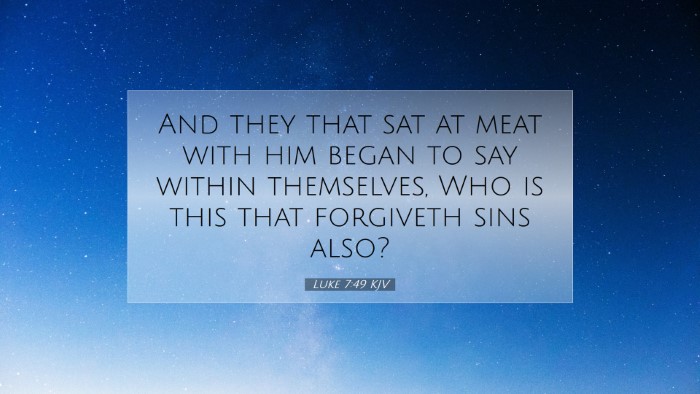Bible Commentary on Luke 7:49
In Luke 7:49, the verse states:
"And they that sat at meat with him began to say within themselves, Who is this that forgiveth sins also?"
Contextual Analysis
This passage occurs during a significant episode where Jesus is anointed by a sinful woman. The gathering at Simon the Pharisee's house serves as the backdrop for a profound revelation of Jesus' authority and identity. As Jesus publicly forgives the woman's sins, the guests, particularly the Pharisees, express their skepticism regarding His divine prerogative.
Insights from Matthew Henry
According to Matthew Henry, this verse highlights the perception of the onlookers. He comments on their surprise and incredulity at Jesus' ability to forgive sins, emphasizing that for many, the act of forgiveness was solely reserved for God. Henry notes:
- This reflects the spiritual blindness that often accompanies rigid religious structures.
- Henry suggests that ignorance of Christ’s divine nature inhibits recognition of His authority.
- He emphasizes that forgiveness is one of Christ's primary missions, essential for salvation.
Albert Barnes' Commentary
Albert Barnes also sheds light on this critical verse, noting:
- He explicates that the phrase “Who is this” represents a pivotal question, one that reflects the curiosity and doubt surrounding Jesus’ identity.
- Barnes points out that those around Jesus were filled with disbelief, failing to see the divine authority Jesus possessed.
- He indicates that the forgiveness of sins is a core aspect of Jesus’ ministry, which was both startling and transformative.
Interpretation by Adam Clarke
Adam Clarke provides a deeper theological perspective on this passage, stating:
- Clarke emphasizes the connection between sin and forgiveness, suggesting that the woman’s need for forgiveness reinforces Jesus’ role as the redeemer.
- He further argues that the skepticism seen among the guests illustrates a common human tendency to doubt when faced with divine action.
- Moreover, Clarke suggests that this narrative serves as a profound reminder that Jesus challenges societal norms by extending grace to the marginalized.
Theological Implications
Luke 7:49 prompts various theological reflections, particularly regarding:
- Authority of Christ: The act of forgiving sins reaffirms Jesus' divine authority, which challenges both religious and societal understandings of power and grace.
- Nature of Forgiveness: Forgiveness is central to the gospel message, and this passage serves as a model for understanding the grace extended to all, especially sinners.
- Human Response to Divine Action: The questioning and skepticism of the crowd highlights the struggle of faith and the need for revelation in understanding Jesus' identity fully.
Practical Application
For pastors, students, and scholars alike, this verse provides substantial ground for reflection and teaching:
- Encouragement to Extend Grace: Just as Jesus forgives the woman, believers are called to emulate His grace, reaching out to those often marginalized or shunned.
- Reflection on Personal Sin: Engaging with this text invites personal confrontation with sin and the joyful acceptance of Christ’s forgiveness.
- Questioning Spiritual Authority: The skepticism of the onlookers invites both personal and congregational discussions on the nature of divine authority in our lives today.
Conclusion
In conclusion, Luke 7:49 is a profound reminder of both the transformative nature of Jesus' ministry and the often skeptical response humanity has toward divine grace. The insights from commentators such as Matthew Henry, Albert Barnes, and Adam Clarke offer a rich tapestry for understanding this scripture. They collectively encourage believers to engage with the radical nature of forgiveness, urging the church to recognize the profound authority of Christ in the ongoing narrative of redemption.


